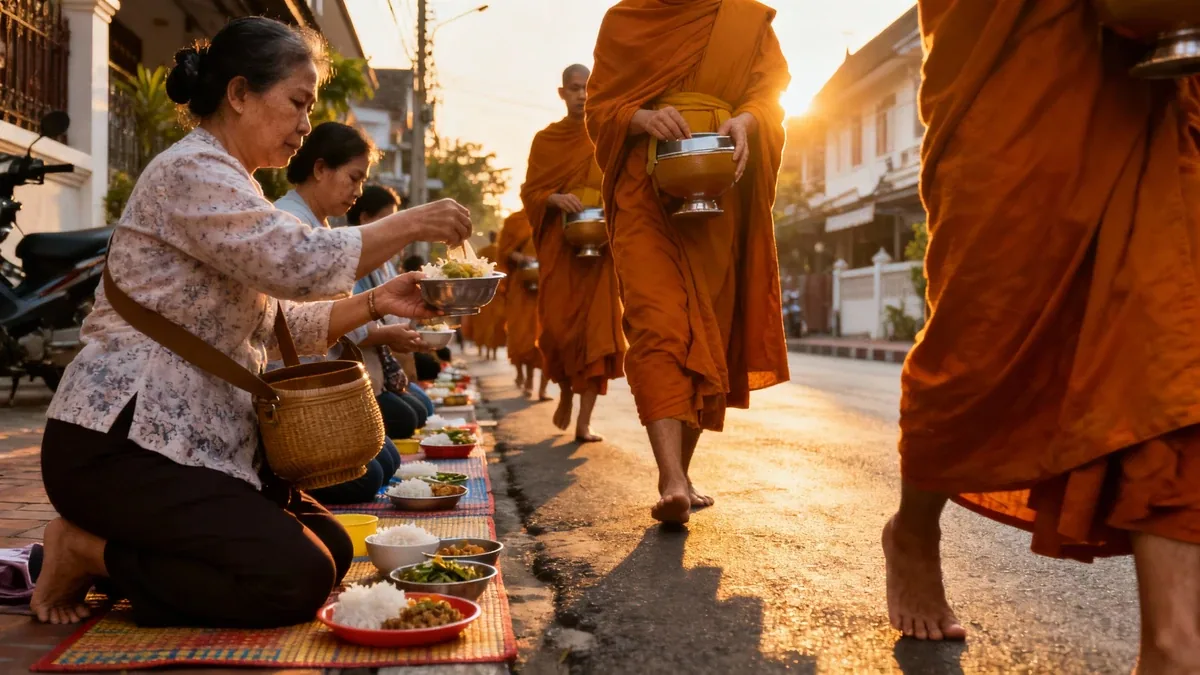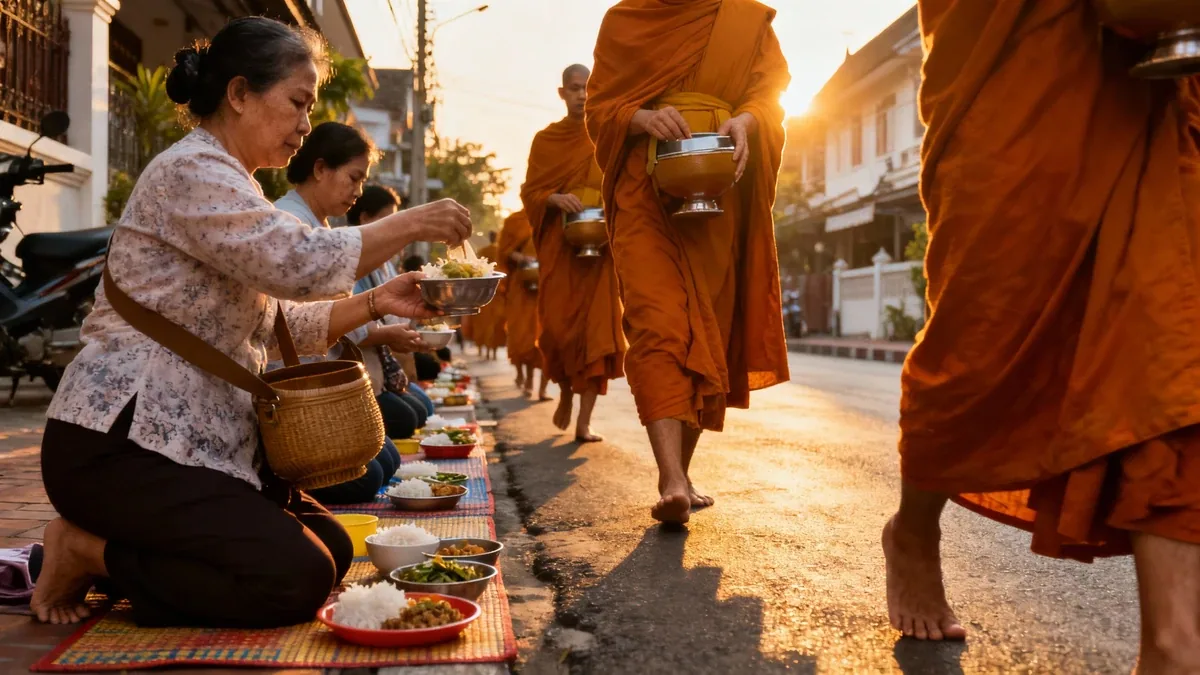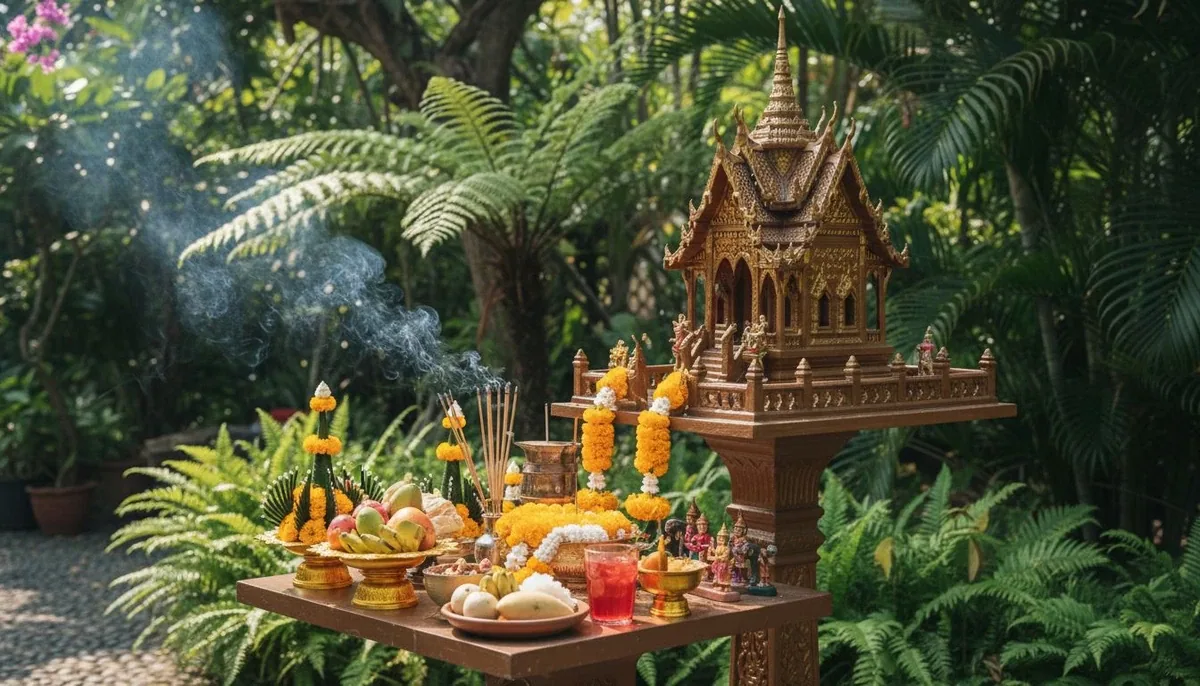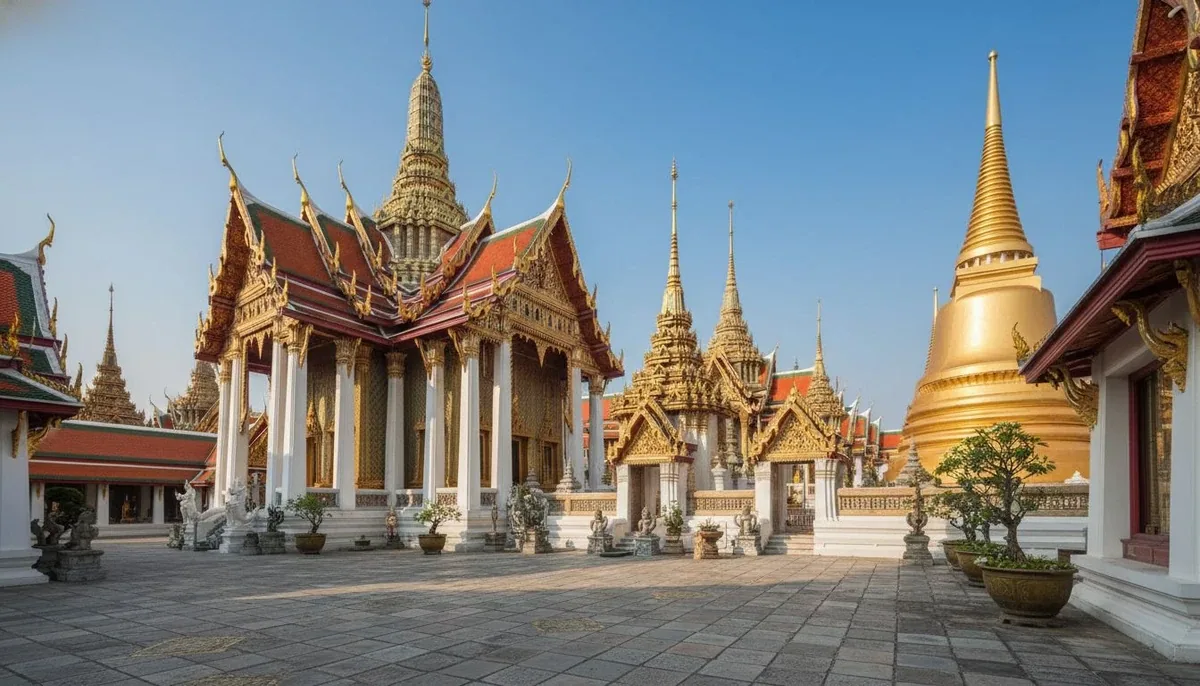
🙏Buddhism in Daily Life
How Buddhism shapes everyday Thai culture and practices

How Buddhism shapes everyday Thai culture and practices
Walk through any Thai neighborhood at dawn, and you'll witness something that has remained unchanged for centuries. Barefoot monks in saffron robes move silently through the streets, their alms bowls held steadily before them. Residents kneel on mats outside their homes, waiting to place rice and curry into those bowls. This simple exchange—food for spiritual merit—is just one of countless ways Buddhism weaves itself into the fabric of daily Thai life.
Buddhism isn't practiced in Thailand; it's lived. Roughly 90-94% of Thais identify as Buddhist, predominantly following Theravada Buddhism, but to call it their religion misses the deeper truth. Buddhism in Thailand is less a set of beliefs you adopt and more the air you breathe—it shapes how you greet strangers, conduct business, understand suffering, and move through the world. For expats, understanding this pervasive influence is essential to understanding Thailand itself.
"Buddhism in Thailand is less a set of beliefs you adopt and more the air you breathe—it shapes how you greet strangers, conduct business, understand suffering, and move through the world."
If there's one concept that unlocks Thai culture, it's tam bun—making merit. This isn't about earning points toward heaven or buying karma credits. Merit-making reflects a deep belief that good actions create positive energy that flows through this life and into future rebirths. It's why you'll see businesspeople stopping mid-negotiation to give money to a blind beggar, or why your Thai colleague takes their entire salary and donates half of it on their birthday.
The morning alms round—that dawn ritual with the monks—is perhaps the most visible form of merit-making. But here's what took me years to understand: it's not charity. The monks aren't accepting your generosity; you're grateful they're giving you the opportunity to make merit. They're providing a service by allowing you to perform a spiritual act. This inversion of how Westerners typically think about giving and receiving runs through many Thai-Buddhist interactions.
Merit-making happens in countless everyday moments. Your neighbor sponsors a temple festival not for social status but to accumulate merit for their deceased parents. A friend releases birds at a temple fair, hoping the act of freeing a caged creature generates positive karma. A new business opens with monks chanting blessings, the owners not seeking divine favor but creating merit through supporting the sangha. These aren't superstitions—they're expressions of a worldview where intention and action are intrinsically connected to your spiritual trajectory.

If you want to observe or participate in alms giving, arrive around 6:30am at any residential area near a temple. Bring rice and simple prepared food in a small container. When monks approach, kneel or sit (always position yourself lower than the monks), remove shoes, and place food gently in their bowls without touching them. Women should be especially careful not to make physical contact. The monks may chant a blessing—sit quietly and respectfully. The entire exchange takes less than a minute, but the weight of its tradition spans millennia.
You'll see monks everywhere in Thailand—riding the BTS, shopping at 7-Eleven, scrolling through smartphones. This visibility can be jarring for visitors expecting cloistered ascetics. But Thai monks exist within society, not apart from it. They're sons, brothers, uncles who have taken temporary or lifelong vows. Many Thai men undertake short-term ordination at some point in their lives, typically for a few weeks or months, often in young adulthood or just before marriage. It's considered one of the greatest gifts you can give your parents—becoming a monk transfers significant merit to them.
Monks follow 227 precepts that govern everything from when they eat (only before noon) to how they handle money (by rule they shouldn't, though practice varies). They're celibate, own almost nothing, and maintain strict boundaries—particularly with women. If you're a woman, avoid touching monks or handing items directly to them; place offerings within reach for them to collect. On public transport, leave space to avoid accidental contact and offer monks your seat. These aren't arbitrary rules; they protect the purity of the monks' practice and maintain the boundary between monastic and lay life.
But here's what surprised me: monks are deeply involved in community life. They bless weddings and preside over funeral rites (marriages are legally registered at a district office), bless new businesses and homes, counsel families through difficulties, and serve as mediators in disputes. Senior monks command immense respect—their opinions can sway community decisions, and their wisdom is sought on everything from family conflict to national political issues. They're spiritual guides and social anchors simultaneously.
→ Monks walking barefoot at dawn, collecting food offerings in their alms bowls
→ Spirit houses outside many buildings, with daily offerings of food and flowers
→ People pausing to wai (prayer gesture) when passing temples
→ Amulets worn around necks for protection and merit
→ Yellow 'เจ' flags at eateries during the Vegetarian Festival (late Sept–Oct)

The Thai calendar is punctuated by Buddhist observance days. Four times each lunar month, wan phra arrives—Buddhist sabbath days when devout practitioners observe eight precepts instead of the usual five. Temples fill with worshippers, and you might notice your Thai colleagues seem particularly serene. Full moon days hold special power; temples overflow with people making merit, circumambulating the ordination halls three times with candles, flowers, and incense.
Then there are the major holidays. Visakha Bucha, celebrating Buddha's birth, enlightenment, and death, all of which remarkably occurred on the same day of the year. Makha Bucha, commemorating when 1,250 enlightened disciples spontaneously gathered to hear Buddha preach. Asalha Bucha, marking his first teaching. On these days, alcohol sales are restricted nationwide (with 2025 exemptions for specific venues like international airports and licensed hotels), and Thailand takes a collective breath to honor its spiritual foundation.
Buddhist Lent, khao phansa, spans the three-month rainy season when monks traditionally remain in their temples for intensive study and meditation. During this period, many Thais eat vegetarian, marriages are postponed (it's considered inauspicious), and the pace of life subtly slows. The end of Lent brings Kathina, when communities present new robes to monks—it's part festival, part solemn ceremony, wholly Thai.
You don't need to be Buddhist to live comfortably in Thailand, but you need to respect that Buddhism infuses nearly everything. That colleague who won't close a business deal on a day the astrologer deemed inauspicious? They're not being difficult—they're honoring a worldview where spiritual and material realms intertwine. Your landlord who insists on having monks bless your new apartment? It's not superstition; it's setting proper spiritual foundations.
When visiting temples—and you will, whether for tourism or because they're the social heart of communities—dress modestly. Cover your shoulders and knees. Remove your shoes. Never point your feet toward Buddha images (feet are spiritually low, heads are high; this hierarchy shapes much of Thai body language). Don't touch Buddha statues or pose disrespectfully with them. Photography is usually fine, but ask first, and never photograph monks without permission.
Perhaps most importantly, approach Buddhism with genuine curiosity rather than casual tourism. Many temples offer meditation classes in English. Monks at major temples like Wat Pho or Wat Mahathat are often happy to answer questions. Some temples even offer temporary ordination programs for foreigners. These experiences won't make you Buddhist, but they'll give you windows into the philosophy that has shaped Thai culture for over 700 years.

Before you go: Dress modestly (shoulders and knees covered), bring a scarf if you're unsure about your outfit, and carry 20-100 baht for temple donations. Arrive in the morning or late afternoon when temples are most active but not crowded.
When you arrive: Remove your shoes before entering any building. If locals are praying, observe quietly from a respectful distance. You can participate by sitting with your feet tucked behind you (never pointed toward Buddha images), hands in prayer position. Following what others do is always safe. Three prostrations—lowering your forehead to the floor with hands in prayer—is traditional but not required for visitors.
Common offerings: Lotus flowers, incense, and candles can usually be purchased at temple entrances for small donations. Watch how Thais light incense (typically three sticks) and place flowers before Buddha images. The actions matter less than the respectful intention behind them.
That ubiquitous Thai phrase mai pen rai ("never mind," "no worries") isn't about being carefree or irresponsible. It emerges from Buddhist teachings about impermanence and non-attachment—a conscious choice to not add negative energy to challenging moments.
What's hardest to convey about Thai Buddhism is how it shapes consciousness itself. That frustrating Thai tendency to avoid confrontation? It's rooted in Buddhist values of harmony and the belief that anger creates negative karma. The elaborate politeness and indirect communication? They reflect Buddhist ideals about right speech and causing no harm.
Even Thai smiles, which can confuse newcomers because they appear in what Westerners consider inappropriate contexts, connect to Buddhism. Smiling in difficult situations isn't denial—it's an attempt to maintain equilibrium, to not add negative energy to an already challenging moment. It's Buddhism made visible on faces throughout the kingdom.
Living in Thailand means living alongside Buddhism whether you practice it or not. It's in the spirit houses outside so many buildings, the amulets worn for protection, the astrology that guides major decisions, the fortune tellers consulted before business ventures. It's in the way Thais accept traffic jams with equanimity, treat elderly people with reverence, and maintain that sometimes maddening but ultimately beautiful belief that good actions create good results, if not today then someday, if not in this life then the next.
You don't have to believe any of it. But understanding it—really understanding why your Thai neighbor rises before dawn to give alms, why temples remain vital community centers in the digital age, why merit-making shapes everything from business to romance—will deepen your experience of Thailand immeasurably. Buddhism isn't just what Thais believe. It's how Thailand breathes. For more insights into Thai customs and etiquette, explore our comprehensive cultural guides.
DO
DON'T
Remember
You don't need to be Buddhist to visit temples respectfully. Thais appreciate genuine interest in their spiritual traditions.
Visakha Bucha
May full moon · Buddha's birth, enlightenment & death
Makha Bucha
February full moon · 1,250 disciples gathering
Asalha Bucha
July full moon · First teaching
Alcohol sales restricted on these days (2025 exemptions for airports, licensed hotels)